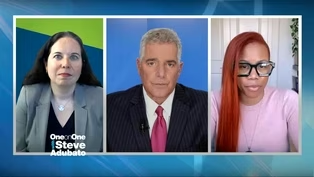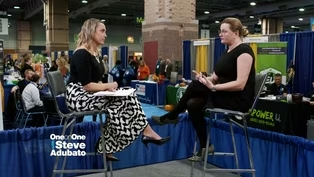One-on-One
Culturally Sustainable Programs at NJIT
Clip: Season 2023 Episode 2608 | 9m 34sVideo has Closed Captions
Culturally Sustainable Programs at NJIT
Steve Adubato sits down with David E. Jones, Ed.D., Chief Diversity Officer at NJIT, to discuss the culturally sustainable programs that are encouraging diversity and inclusion at NJIT.
Problems playing video? | Closed Captioning Feedback
Problems playing video? | Closed Captioning Feedback
One-on-One is a local public television program presented by NJ PBS
One-on-One
Culturally Sustainable Programs at NJIT
Clip: Season 2023 Episode 2608 | 9m 34sVideo has Closed Captions
Steve Adubato sits down with David E. Jones, Ed.D., Chief Diversity Officer at NJIT, to discuss the culturally sustainable programs that are encouraging diversity and inclusion at NJIT.
Problems playing video? | Closed Captioning Feedback
How to Watch One-on-One
One-on-One is available to stream on pbs.org and the free PBS App, available on iPhone, Apple TV, Android TV, Android smartphones, Amazon Fire TV, Amazon Fire Tablet, Roku, Samsung Smart TV, and Vizio.
Providing Support for PBS.org
Learn Moreabout PBS online sponsorship(upbeat music) - We're now joined by Dr. David Jones, Chief Diversity Officer at the New Jersey Institute of Technology, NJIT, one of our higher ed partners.
Dr. Jones, great to have you with us.
- It's a pleasure to be with you.
Thank you for having me.
- You got it.
How would you describe your role at NJIT?
- Certainly, you know, my role, I serve as diversity lead for the institution in providing initiatives, programs, and developing policy that works to create an inclusive campus environment for our faculty, our staff, and most importantly, our students.
- You know, Dr. Jones, I'm curious about this.
We talk about DE & I, DEI, and where it's rhetoric and where it's real, where it's window dressing and when it's real.
What about if someone says, you know what?
This should just be natural, it should be organic.
Organizations should do it without having a chief diversity officer, without having to name a program.
But it doesn't.
- Right.
- Does it?
(David laughs) Talk to us.
- Certainly, no, absolutely.
You need the leadership in place.
You need the infrastructure in place to be able to build out sustainable, right, culturally sustainable initiatives and programs that allow people, particularly people from underrepresented backgrounds, to feel a sense of belonging, to feel a place that is affirming in their identities and their cultural beliefs and values within the organization.
And so chief diversity officers or diversity leads for organizations are critical to building out that type of infrastructure if we wanna be able to sustain these efforts.
And, and let's face it, right, we're looking at a society in which our cultural climate is faced with realities that disenfranchised people from underrepresented backgrounds.
And so to build in this infrastructure, not only is it culturally responsive to what we're seeing in a society at large, but it builds in a culture that allows employees in organizations and students within higher education to thrive, particularly those that come from disenfranchised backgrounds.
- There are some folks who I've heard be critical of what they perceive diversity, equity, and inclusion, what it really means, what it should mean, what you do when your colleagues do every day.
And the response sounds like this.
"You know, I understand that we need to diversify, but you know, sometimes we quote, we go too far."
When I hear that, I often ask myself, "Well, aren't we playing catch up?"
Talk to us.
- Right.
Certainly.
We are playing catch up.
I mean, we're dealing with a society in which there's longstanding systemic and structural inequities and barriers that have placed people of color, members of the LGBT community, women, persons with disabilities, right?
And thinking about religious diversity, you know, and ways in which they have been disenfranchised and marginalized for far too long.
And so- - Including in the media.
- Including in the media.
And so we need to be able to factor in particular initiatives and leadership in place that is responsive to what we're seeing every day in our society.
And so, you know, these type of roles, the role that I'm serving in, is a very critical role.
It supports the president and his mission.
It upholds the values and cultural beliefs and core values of the institution.
And it places us on a path toward success and employee engagement and student engagement that I think is really critical for higher education.
- Let's talk more specifically... By the way, talking to Dr. David Jones, Chief Diversity Officer at NJIT.
Name a specific initiative that you and your colleagues are involved in, that in fact, work toward diversifying the culture in the workforce and the environment at NJIT, which can be replicated, and is being replicated I'm sure in other places, other institutions of higher learning, please.
- Certainly.
And so we have just put in place a university-wide committee on inclusive excellence, and this committee is going to be a body of faculty, staff, students, and alumni to serve in partnership with me to address key priorities that are happening at the university level to ensure that our students and our faculty and staff, particularly those from diverse backgrounds, are feeling supported and affirmed within their identities and cultural beliefs here while they're at NJIT.
And so this committee is going to be a representation of the university across all disciplines and aspects of cultural life here at the university, to ensure we are making, to ensure we are being responsive to all of our constituent groups.
- Quick question, when it comes to faculty, right?
Recruiting faculty members, hiring faculty members, and making the faculty, frankly, more diverse, historically disproportionately represented by white males, okay?
How challenging is it, Dr. Jones, to actually recruit a diverse faculty workforce that A, wants to be in higher education in these challenging times, right?
Not getting super rich doing that.
But also qualified to do it.
Talk about that.
Not easy.
- It's not easy.
But I think, you know, one of the things I think makes it achievable is if you build in the infrastructure, right?
If you build in- - What does that mean?
What does that mean, building in infrastructure?
- For example, So for example, you know, we're looking at building out training, and learning, and development opportunities so that our faculty and staff can have the diverse equity inclusion capacity, right, to be able to engage with people across difference.
Where we can build in a collection of understanding and awareness around our differences and allow our differences to bring us together, not necessarily divide us, right?
And so one of the things that I'm working on currently is a partnership with our office of our provost, is that we're going to have a two-day professional learning experience for our faculty and staff in where they're going to engage in understanding how to identify, confront unconscious bias in the classroom and out of the classroom.
So building out that capacity among our faculty and staff is critical to ensuring we're creating the type of workplace environment that is inclusive for those that we recruit.
- Last question.
Where'd you grow up?
- I'm originally from Brooklyn, New York.
So that's where my roots begin.
And then I, later in life, during my adolescent years moved to Hartford, Connecticut, the Greater Hartford Connecticut area, and lived in Windsor, Connecticut.
- So you lived in Hartford.
Unique experience- - No, I lived in I lived in Windsor, Connecticut, the Greater Hartford.
- Quick question.
Where and how you were raised?
Significant impact on the work you do?
- Absolutely.
I would say, you know, coming from Brooklyn, New York, and then moving to a suburb of Hartford, Connecticut, my experiences, particularly around my racial identity, hugely impacted my life growing up.
- How so?
You were one of only a few African American families?
- Sure.
Yeah.
We were only one of a few African American families in the neighborhood that we lived in.
I attended schools where I was one of few black males in my class.
And so the sense of only-ness, right, in the educational space, impacted my racial identity development and in ways in which that I think have propelled me to this career where I can now be in the position to help individuals, faculty, staff, or students that might be navigating their own identity, right, in these workplace environments in higher education to help them overcome those challenges and not necessarily have to navigate some of the hurdles and adversity that I had to overcome.
- Not just professional, but highly personal for you.
- Absolutely.
This is my personal work.
This is something that I carry out each and every single day and I'm committed to this work, not just in my role at NJIT, but in the various other ways in which I show up in my community and various other spaces across the country.
- Your passion's clear.
Dr. David Jones, Chief Diversity Officer, NJIT.
Dr. Jones, thank you so much for joining us.
We appreciate it.
- Thank you for having me.
It's been a pleasure.
- You got it.
Same for us.
Be right back.
- [Narrator] One-On-One with Steve Adubato has been a production of the Caucus Educational Corporation.
Funding has been provided by Holy Name.
New Jersey Sharing Network.
The Russell Berrie Foundation.
Valley Bank.
PSE&G, The Fidelco Group.
The Port Authority of New York and New Jersey.
The Healthcare Foundation of New Jersey.
And by The New Jersey Education Association.
Promotional support provided by The New Jersey Business & Industry Association.
And by AM970 The Answer.
- Hello, I'’m Dr. Luke Eyerman, a family medicine specialist at Holy Name.
When was your last visit to your primary care doctor?
Throughout the pandemic, many patients have put off their annual physicals and screenings, but preventative healthcare is critical for early detection of illnesses and to avoid future health problems.
Your doctor can also help you develop a wellness plan to achieve your personal health goals.
Your health can'’t wait.
Be proactive and talk to your primary care doctor today about scheduling your annual physical.
How Can We Make Healthy Food More Diverse and Accessible?
Video has Closed Captions
Clip: S2023 Ep2608 | 10m 20s | How Can We Make Healthy Food More Diverse and Accessible? (10m 20s)
How Do Librarians Feel About Book Banning in NJ?
Video has Closed Captions
Clip: S2023 Ep2608 | 8m 24s | How Do Librarians Feel About Book Banning in NJ? (8m 24s)
Providing Support for PBS.org
Learn Moreabout PBS online sponsorship
- News and Public Affairs

Top journalists deliver compelling original analysis of the hour's headlines.

- News and Public Affairs

FRONTLINE is investigative journalism that questions, explains and changes our world.












Support for PBS provided by:
One-on-One is a local public television program presented by NJ PBS

